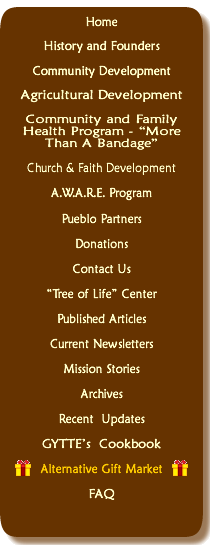|
|
|
Article from the March / April 2008 Issue of the Mission Magazine New World Outlook
Eleuterio and Celia Jimenez, an elderly couple living in the village of Alchichica, Puebla, in South Central Mexico, are always open to receiving friends and strangers for a visit under the trees of their outdoor patio. They often share their faith through music, and they enjoy singing their favorite hymns in two-part harmony. Eleuterio and Celia have raised 12 children on their small parcel of land, feeding their family from the agricultural products they grew, mostly corn and beans, as well as the fruit from their 12 mango trees—one planted for each of their children.
One adult daughter remains at home with the Jimenezes, while the other children have moved away. A few send small amounts of money every couple of months to help with their parents' support. As in most developing nations, once parents are too old or too sick for gainful employment, they live on what their children can afford to give them. This couple lives in just one room, and when the temperature is too hot to sleep inside, they spend their nights outside on a woven straw mat. |
|
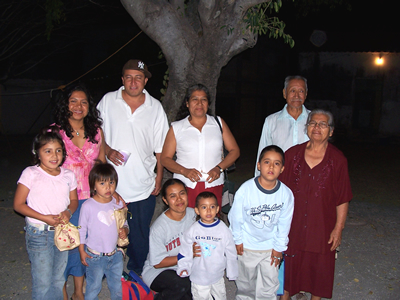 |
With age came health issues like arthritis, cataracts, digestive and respiratory problems, and diabetes. It's difficult for the Jimenezes to walk outside to the pit latrine far beyond their room, especially at night. Give Ye Them to Eat (GYTTE) staff and work-team members helped their daughter build a bathroom onto their one room, making everyday living easier. It is equipped with a dry-composting toilet system and adjoining shower stall. Many of the technologies taught by the GYTTE staff improve daily life while taking the environment into consideration.
Development Over the Long Term
Over the past 30 years, the GYTTE program has trained and equipped tens of thousands of people to take care of their own needs and also serve others. Each year, GYTTE staff and its trainees reach out to thousands more. In 2007, approximately 15,000 people were empowered to move from subsistence living to lives of dignity through training events, learning experiences, and community activities.
A social outreach project of the Methodist Church of Mexico, GYTTE was founded in 1977 to combat hunger and poverty in the rural sector. Since its founding, GYTTE, named by the late Bishop Dr. Alejandro Ruiz, has been directed by Global Ministries' missionaries Muriel and Terry Henderson, originally from the Desert Southwest Conference. The program's purpose is to strengthen the capabilities of marginalized people and communities to meet their own basic needs and assist them to determine and sustain a just and integrated development process. GYTTE uses people-centered, participatory approaches to help create conditions in which real change can take place

Seminary students from the Baez Camargo Methodist Seminary learn how to build eco-friendly straw bale constructions at the "Tree of Life" Training Center in Tlancualpican, Mexico |
GYTTE first began a partnership with Heifer Project International in 1977 in Puebla , Mexico , to develop a livestock program for local families. GYTTE represented Heifer Project in Mexico until 1991, when Heifer Project of Mexico was incorporated as a separate nonprofit agency under Mexican leadership. In 1990, GYTTE purchased land in the small community of Tlancualpican to open a training center that was named the "Tree of Life."
In time, the mission program grew into an integrated, community-based development project that focused on five aspects of development: community, agricultural, health, livestock, and church and faith. A lively volunteer program called A.W.A.R.E. (Alternate Work-study And Reality Experience) also developed, exposing US groups to the communities of rural South Central Mexico.
|
Community Development
The objective of community development is to better family life, decrease human drudgery, promote an atmosphere of mutual support, and increase people's awareness of the nature and the causes of community problems so that they can learn processes to address them. There are many different aspects to the work of
community development, which empowers people to improve living conditions within communities while preserving their cultures and keeping their families intact. The GYTTE program fosters community development through workshops that teach realistic, low-cost, and low-tech methods for improving daily life.
An important objective of GYTTE is to teach technologies that will improve daily life while protecting the environment. Fuel-efficient mud stoves, solar cookers, food dehydration, and dry-composting toilets, for example, work well in the rural settings. GYTTE also teaches alternative construction methods using eco-friendly construction materials that are readily available. Resources for straw bale, adobe, and cob are plentiful and more suitable in the Tlancualpican area than wood or concrete. These kinds of materials yield structures that are energy efficient, economical to build, and ecologically sound.
Agricultural Development
Agricultural development seeks to preserve and improve the condition of the land, improve agricultural production, and increase family income through sustainable agricultural methods—both ancient and modern. Contour terracing of sloping hillsides prevents erosion of fragile soil and retains moisture for crops. It encourages agricultural production from families who otherwise would have no land to farm. Composting is another way to improve the soil by restoring its nutrients. GYTTE encourages the use of organic fertilizers like green or livestock manure, traditional composting, and vermiculture (composting through the cultivation of worms).
Families earn additional income by selling produce from their increased agricultural yields. They also save money by growing more of their own food through the use of multipurpose trees and family gardens. The GYTTE training center has a demonstration farm that showcases efficient and environmentally friendly techniques—implemented under the same conditions and using the same resources available to most local residents. |
|
"Give Ye Them To Eat" is an Advance Project of The United Methodist Church. Project name and code number. "Give Ye Them To Eat" Advance #07629A. |
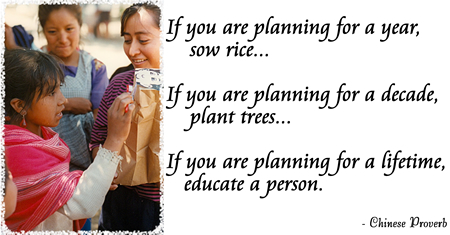
More Than a Bandage
GYTTE's health program, called "More Than a Bandage," is designed to address the health issues and needs of rural communities in Mexico. Village women equipped as volunteer workers for community-based health care help rural families learn about preventive health measures. Community-based health care empowers people to prevent serious disease by changing the conditions that foster illness and treating health problems in early stages before they become major concerns.
The Rev. Marian Hartman from Wellsboro , Pennsylvania , first began volunteering with GYTTE in 2000 at the suggestion of her district superintendent. "The thing that impressed me most was the program's holistic approach to development. It simply changes people's lives in all areas of life. More Than a Bandage just blew me away with what they are able to do with so little. The willingness of the women to take the information back into their communities is what makes it work." |
|
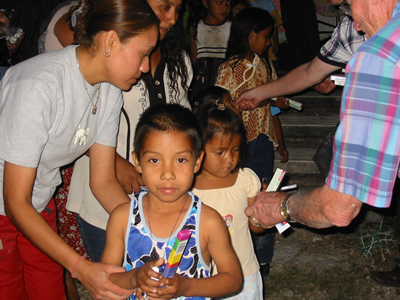
Village children are given toothbrushes by GYTTE's team members, part of a community-based preventive health care project |
Livestock Development
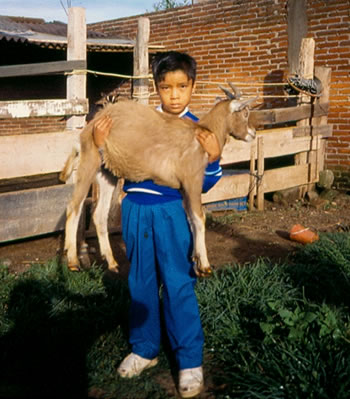
The breeding stock at the "Tree of Life" Center produce the animals distributed to rural families. |
|
GYTTE's Livestock development program enables concerned people and churches in the United States to become involved in a development ministry that combats hunger and poverty through the distribution of food and income-producing animals.
The program in Mexico works with groupings of five to ten families. The livestock distributed varies depending upon people's needs and the available resources. A group's options may include milk goats, sheep, and swine. A vital ingredient to ensure successful livestock production is a training program with hands-on learning experiences. Participating families each receive one female animal. Each group is provided with a quality male animal for breeding purposes at subsidized cost. High quality offspring will provide animal protein, animal products, and income. |
Dr. David Howe, a volunteer from Brentwood UMC in Shelbyville , Tennessee , describes the benefits of the Livestock Development Program. "The poor—many of them women—are responsible for raising pigs and a cow. Terry Henderson teaches them what they need to do to ensure their livestock produced offspring. There are also education programs to help the women raise fish, sheep, and goats."
The program requires a commitment by all parties. Donors provide a financial gift to start a livestock project. GYTTE staff members are involved in training, livestock distribution, and project supervision, as well as communication with the donors. Village partners contract to feed and provide for their animals using the skills and practices they have learned. They also pledge to share some of the offspring, as well as their newly gained knowledge and experience, with other families.
Church and Faith Development
As a mission of the Methodist Church of Mexico, GYTTE is supportive of the spiritual growth of Methodist congregations through training events for laity and clergy. GYTTE produces, compiles, and distributes Christian education materials to local churches. These materials, specific to the life of the church, are used by the Methodist churches in the Southeast Annual Conference of the Methodist Church of Mexico, as well as in other churches, districts, and conferences that request them.
GYTTE hosts workshops to train laity and clergy in age-appropriate teaching, participatory education, puppetry, and drama, as well as teacher-training events for the annual Vacation Bible School . GYTTE provides scholarships for Methodist students attending one of the two Methodist seminaries in Mexico .
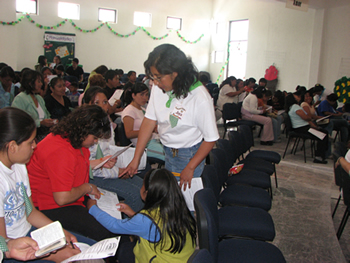
GYTTE staff member, Jocabeth Casique, assists workshop participants at the annual VBS teacher training event. |
|
Jean Hartman, a volunteer from Simpson United Methodist Church in Evansville , Indiana , says that her church has provided scholarship money for two students. "We didn't pay the full cost; part of the GYTTE program is that the students have to earn part of the cost of their education, and they volunteer with GYTTE as well. Today, Janet is involved in education and Miguel in communication. They wrote to us each semester to let us know what they were up to."
Personal transformation is a vital component in a development process that first seeks to assist people in becoming self-reliant and then gives them the opportunity to make a commitment to God and to others in need.
Jean Hartman says: "We always think we are going to help and then we come away with so many blessings. One of the big ones is to see how alive and well the Holy Spirit is with the Mexican people. We come back thinking we're weighted down with all our extra stuff and we don't even realize how exciting life in the spirit can be." |
A.W.A.R.E.
The GYTTE Alternative Work-study and Reality Experience (A.W.A.R.E.) program offers educational and work experiences for Mexican and international visitors, volunteers, and teams. The program is designed for adults of all ages, immersing them in the reality of life in rural Mexico , especially as it relates to the issues of hunger, poverty, and development.
Marian Hartman has seen the change in her colleagues and parishioners when they return from an A.W.A.R.E. experience in Mexico . "They come back with a bigger heart for mission. Whether they continue to return to Mexico on work teams or get involved in local mission work—they are just changed by the poverty they have seen. |
|
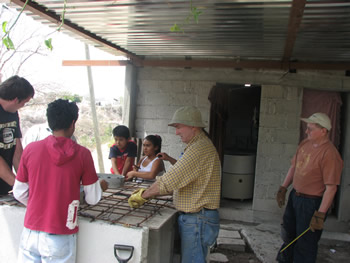
Indiana workteam members, Jim Close and Maurice Hahn, join with a village family to construct the base of their dry composting toilet system. |
"Some go to volunteer in another country, or Red Bird Mission in Kentucky , local food pantries, shelters, or neighborhood centers. The poverty they see in rural Mexico is much more drastic than what we see in the United States . Returning volunteers become more cognizant of the poverty around them. In the rural villages, we've been in homes where a family of six lives in two rooms with dirt floors, and the stove is an open fire hole in the floor in the kitchen. There is no running water, and the water there isn't clean or drinkable. Many still carry their clothes to the river and wash them on the rocks.
"Yet these people are so grateful for God's blessings and so welcoming of us. They had very little but were proud to share with us what little they had."
Pueblo Partners
Pueblo Partners is a program designed to empower the rural people of Mexico to improve the conditions of daily life within their own cultures, communities, and families. This partnership focuses on three areas: community-building, agricultural resources, and livestock.
Week-long courses are hosted at the Tree of Life Training Center. Workshops cover realistic, low-cost, and low-tech methods for improving daily life. These methods focus on using readily available resources, setting goals that are economically attainable for rural residents, integrating ancient and modern technologies, and preserving the environment. Those trained become resource persons, sharing their new skills and knowledge with their own families and neighbors.
| Long to Be A.W.A.R.E.?
The GYTTE staff and the Methodist Church of Mexico are grateful to the many Christians who volunteer to participate on A.W.A.R.E. teams that come to serve with Give Ye Them To Eat. Teams of 10 to 16 people travel to Mexico to serve for nine to ten days at the Tree of Life Training Center for Integrated Development in Tlancualpican , Puebla , Mexico . For more information, contact GYTTE. Visit the website at www.gytte.org or send an e-mail to GYTTEphm@aol.com . |
Irma Carreon is a 34-year-old wife and mother living in Colonia, a dusty community on the outskirts of the border town of Agua Prieta, Sonora, a place created by informal settlers. She and her husband, Jose Ramon Amaya, have four daughters and two sons. Mrs. Carreon says that she is grateful to God for the invitation she received to train with GYTTE's Community and Family Health Program called "More Than a Bandage." Irma said she decided to attend the training courses to become a community-based, primary health care worker because there is so much need in her community, where few social services are available.
Besides being a conscientious worker, Irma has a quick wit and infectious laugh. She is also the
designated leader of her community group called "Opportunities," which is organized through a government program. Through this program, she worked for two years with a lunch project for the elementary school that some of her children attend. Although Mexican schools do not generally serve meals, when the government discovers a school in an area where children are at risk for malnutrition, it organizes and funds a community group to serve one meal, Monday through Friday, to ensure that the children eat at least once a day.
Irma found the subjects in the GTTYE-sponsored basic health course helpful. She immediately put into practice the information she gained on nutrition and disinfecting fruits and vegetables, at the school lunch program as well as in her home. She was also glad to learn the importance of each family member's having his or her own personal toiletry items—comb, toothbrush, nail clippers—to avoid the spread of disease
and infection.
Because of Mrs. Correon's volunteer position with Opportun- ities and her newly gained knowledge of health issues, many doors have opened to her. She has been invited to teach preventive health measures in local public schools and at community events. Within a period of just five months after completing the basic health course, she had taught nearly 400 people about dental hygiene, personal hygiene, disinfecting fruits and vegetables, sanitary dish washing, dehydration, oral rehydration therapy, and self-esteem.
Mrs. Carreon completed the advanced health course in December 2007 and is delighted with all the new things she learned. She is motivated to share this new information because she believes that students and families need it. Sexuality, prevention of sexually transmitted diseases, family planning, and early detection of breast cancer and other cancers are just some of the subjects she plans to teach at upcoming community gatherings and schools. |
|
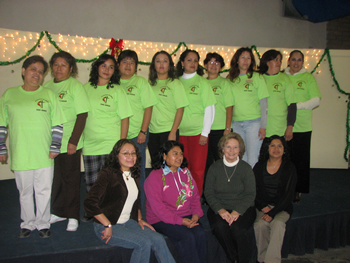
Bottom row, left to right: Yanet Lira, Veronica Palacios, Muriel Henderson, and Estela Jimenez, train Mexican women to become community-based, primary health care workers. Standing are 10 graduates of the training program. Irma is third from the left. |
Veronica Palacios is a nurse and director of GYTTE project's "More Than A Bandage" program.
 |
 |
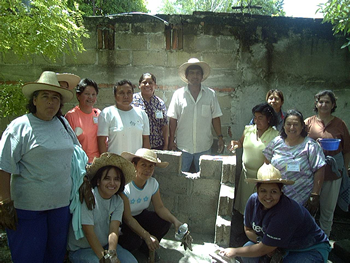
Participants in the Dry Composting Toilet System workshops will be able to construct eco-friendly, sustainable toilet systems for their homes after they complete their training. GYTTE staff member, Liborio Marin, center, shows the women how to mix cement by hand and lay block. They now have hands-on experience with the building materials.
|
|
Cristina Perez decided to participate in a great adventure in the company of 11 other villagers from Mataplanta , Veracruz . They traveled more than five hours to the GYTTE Tree of Life Training Center in Tlancualpican , Puebla , to take part in a workshop on the Dry Composting Toilet System. This was the first time Cristina had traveled out of her village, and she had great hopes that learning about this technology would improve the quality of life for her family by providing an appropriate and cost-effective solution to their sanitation needs.
During the workshop, Perez explained that in her community some of the families have pit latrines like hers, whereas others have no sanitation facilities whatsoever. Although it embarrassed her to say so, she noted that when their latrine was full, the only thing they could do was to empty out the pit in order to use it again. Disposing of the sewage was yet another problem. |
Recently, the government offered to help Perez's community by putting in sewage lines so families could build flush toilets, but villagers found this approach problematic. The cost per household to connect to the sewage line was more than many families could afford. The lack of water available to homes made a flush toilet an unlikely solution, and the government's plan to pipe sewage to the river would contaminate the water source villagers used for bathing, clothes washing, and fishing.
Cristina said the workshop was a blessing for her and the entire group because it offered an economical alternative that enabled them to solve their sanitation problem without contaminating their world. The group expressed joy over the concern the GYTTE program has for people and their needs. After the workshop, Cristina and her family built a dry composting toilet system in their small home. This has brought about a big change in their lives.
Catalino Sanchez is the coordinator of Give Ye Them To Eat's Pueblo Partners Program.
Christie R. House is the editor of New World Outlook. Terry and Muriel Henderson have served as Global Ministries' missionaries in Mexico for 35 years.
|


